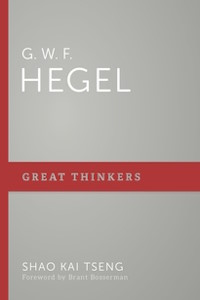Handling Hegel
G.W.F Hegel (1770–1831) is one of western philosophy’s most influential and challenging Great Thinkers. In this short but rich book, Shao Kai Tseng introduces Hegel’s philosophy and responds from a Reformed Christian perspective.
Hegel in context
 After a short introduction explaining his own discovery of Hegel and a recognition of Hegel’s wide-ranging influence, Tseng begins his overview of Hegel’s philosophical system. He starts by setting Hegel in his historical context by summarising the state of philosophy in his time. The key figure is Kant, who through his critique of Enlightenment philosophy concludes that ‘within the bounds of pure reason…it is impossible to know anything about the existence of God as an object external to our minds’ (20). Hegel responded with his system of absolute idealism, which ‘no longer posits a reality-in-itself apart from the mind. For absolute idealism, the mind is everything, and everything is the mind’ (22). Bizarre as this may sound to us, Hegel’s ideas aim to protect theology from Kant, for if God is the mind, the problem of the mind’s inability to know God as external to itself vanishes.
After a short introduction explaining his own discovery of Hegel and a recognition of Hegel’s wide-ranging influence, Tseng begins his overview of Hegel’s philosophical system. He starts by setting Hegel in his historical context by summarising the state of philosophy in his time. The key figure is Kant, who through his critique of Enlightenment philosophy concludes that ‘within the bounds of pure reason…it is impossible to know anything about the existence of God as an object external to our minds’ (20). Hegel responded with his system of absolute idealism, which ‘no longer posits a reality-in-itself apart from the mind. For absolute idealism, the mind is everything, and everything is the mind’ (22). Bizarre as this may sound to us, Hegel’s ideas aim to protect theology from Kant, for if God is the mind, the problem of the mind’s inability to know God as external to itself vanishes.
Hegel’s philosophical method
After this, Tseng provides a brief biography, before outlining the substance of Hegel’s thought. Tseng states that the method of Hegel’s system is ‘identical with the content’ (33). He goes on to explore this method from two different angles, as speculative and dialectical.
Speculative means that it ‘assumes that there is an intrinsic connection between the mind and external reality in such a way that we can make sense of the world through rational speculation’ (32). In one sense, this is the same as many philosophers before Hegel who start with the mind and attempt to build an all-encompassing rational system. The difference is that for Hegel this is only possible because the mind and the external world are ultimately identical.
This book is worth getting for the introduction to Hegel’s thought alone
Dialectical means that it doesn’t describe a static reality, but rather a process which is characterised by an idea first producing its opposite, and the tension between the idea and its opposite in turn producing a third idea which encompasses both the idea, its opposite and the relation between them. If you can get your head around that three-moment process, you’ve grasped the core of Hegel’s philosophy. This process, called ‘sublation’ (56), describes the way mind (the combined total of human consciousness) proceeds. But because Hegel sees mind as identical with external reality, it also describes the way human history unfolds, characterised by inevitable progress. Finally, Tseng briefly describes Hegel’s philosophy of religion with reference to Christianity. By the late stages of his career, Hegel came to see Christian doctrine as ‘express[ing] the content of his philosophical system’ (62). For example, to Hegel the incarnation represents and ‘gave rise to a consciousness of divine-human unity’ (62), and the trinity represents the three moments of the dialectical process.
A Reformed response
In the second half of the book, Tseng offers an assessment of Hegel’s thought from a Reformed perspective. First comes a section on how Reformed thinkers (Bavinck, Vos, Van Til and Schaeffer) have made critical use of Hegel in their thinking on God, Creation, the Bible, and apologetics.
Tseng then offers two criticisms of Hegel’s philosophy from a Reformed perspective. First, drawing on Van Til, he points out that Hegel’s goal, ‘to “reconcile” faith and reason’ (106), is one that his philosophical system fails to achieve. The result of making the divine mind identical to the human mind is that ‘because the universe remains mysterious to the human mind, it remains mysterious to the divine mind also’ (108). As a consequence, ‘Hegel cannot escape the unintended conclusion that “reality is ultimately mysterious”’ (108).
Tseng's second critique is that making the divine mind identical to the human mind leads inexorably to a materialistic worldview, as demonstrated in the philosophy of Ludwig Feuerbach and the theology of David Strauss. Hegel’s view that divine and human consciousness are ultimately identical makes religion, according to Feuerbach, nothing more than human self-projection, and ‘religious consciousness…not the consciousness of an objectively real God, but of human self-consciousness’ (113). For both Feuerbach and Strauss, making humanity and the divine identical results in the loss of any external God whatsoever, producing a materialist worldview.
Challenges and joys
Overall, the book does a great job unpacking a notoriously difficult philosopher, though there is inevitably some dense material. But Tseng works hard to make his writing accessible, providing a useful glossary and using analogies at especially difficult points, which I greatly appreciated.
His overview of Reformed use of Hegel may feel like unnecessary hard work to readers without a prior interest in thinkers like Bavinck or Van Til, but each section gave me a sense of reward as I gained fresh insight into the doctrines covered. His criticisms of Hegel feel straightforward compared to the territory already covered and help us understand both the flaws in his system and why subsequent philosophy and theology developed as it did.
Hegel remains hard work, but this book is warmly recommended
What feels like a potential imbalance is the amount of time given to various spheres of Hegel’s influence. Early on, Tseng points out the major influence of Hegel on figures like Heidegger, Sartre, Derrida, and perhaps most significantly Karl Marx (6). Regrettably, we then hear little to nothing about these thinkers in the rest of the book. While the focus on modern theology and key Reformed thinkers is understandable given the limited size and conscious Reformed identity of the book, one does wonder whether even ten of the thirty-seven pages spent on Reformed use of Hegel might’ve been better spent examining his influence elsewhere.
Imbalances notwithstanding, this is a rewarding little book. It is worth getting for the introduction to Hegel’s thought alone. But for readers with a Christian worldview, Tseng’s response to Hegel is a bonus, and for those with a particular interest in Reformed theology, his review of Reformed thinkers is the cherry on top. Hegel remains hard work, but as introductions go, this book is warmly recommended.
Shao Kai Tseng, Great Thinkers: G.W.F. Hegel. (P&R, 2018), 184pp



